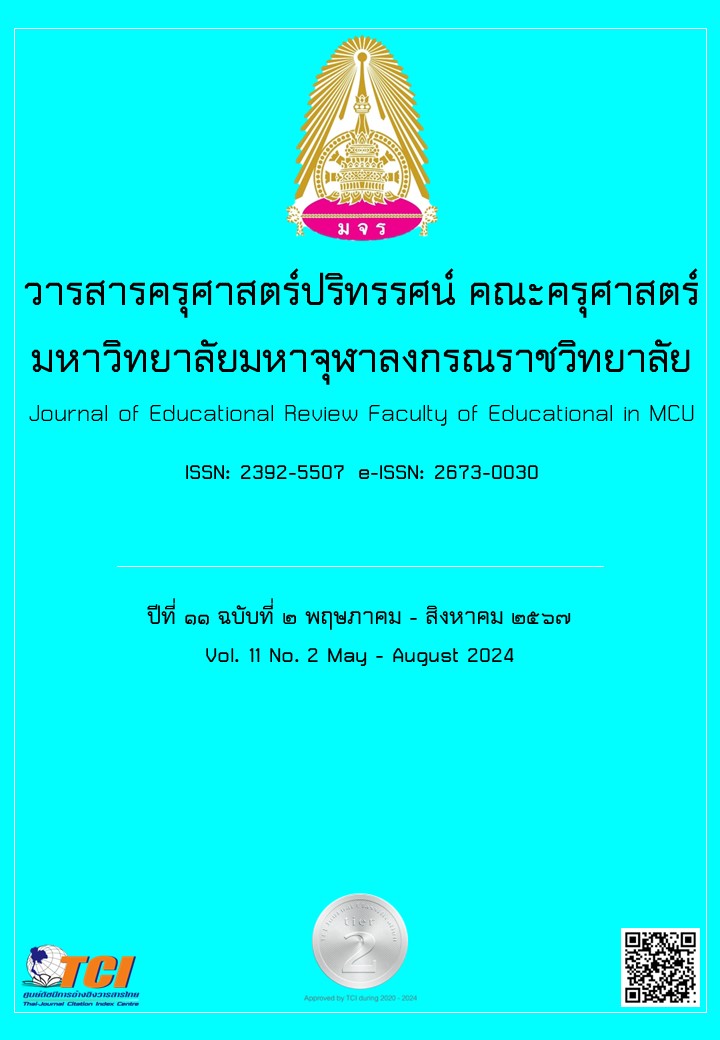THREEFOLD TRAINING WITH THE DEVELOPMENT OF TEACHERS AND EDUCATIONAL PERSONNEL IN A VUCA WORLD
Main Article Content
Abstract
Today's world is changing rapidly. Digital technology plays an important role in every aspect of life. Education itself cannot avoid this change. Teachers and educational personnel therefore must constantly develop themselves to be able to support these changes and develop learners to be able to learn and grow effectively in a VUCA World society and live their lives in a correct and good way. And with the Threefold Training being Buddhist principles that emphasize self-development in morality, concentration, and wisdom, this principle can be applied to the development of teachers and educational personnel to develop skills in various areas to support changes in the changing world and lead to the development of students to be able to cope with the changing world.
This academic article had adopted the threefold principle which is an important doctrine in Buddhism that must be studied and practiced in the training of body, speech, mind, and wisdom. The Threefold Training Path is like a compass that guides the practitioner to the goal. It is the principle of developing skills in morality, concentration, and wisdom to support changes in the world of change and lead to the development of students to have the ability to cope with the world of change as desired, that is, 1) Morality: Develop communication skills, develop teamwork skills, develop skills in ethics and morality, develop skills in citizenship, understanding, awareness, and participation in society. 2) Concentration: Develop analytical thinking skills, develop health skills, develop cultural skills and 3) Wisdom: Develop effective digital technology skills, develop learning skills, and develop language skills.
Threefold Training used in the development of teachers and educational personnel would help to develop and strengthen the necessary skills for teachers and educational personnel in the changing world as being able to adapt effectively to keep up with changes and being able to transfer knowledge to students to have the competency as desired.
Article Details

This work is licensed under a Creative Commons Attribution-NonCommercial-NoDerivatives 4.0 International License.
ทัศนะและความคิดเห็นที่ปรากฏในบทความในวารสารฉบับนี้ถือเป็นความรับผิดชอบของผู้เขียนบทความนั้นเพียงผู้เดียว และไม่ถือเป็นทัศนะและความรับผิดชอบของกองบรรณาธิการ
กองบรรณาธิการขอสงวนสิทธิ์ในการคัดเลือกบทความลงตีพิมพ์และจะแจ้งให้เจ้าของบทความทราบหลังจากผู้ประเมินบทความตรวจอ่านบทความแล้ว
ต้นฉบับที่ได้รับการตีพิมพ์ในวารสารครุศาสตร์ปริทรรศน์ คณะครุศาสตร์ มหาวิทยาลัยมหาจุฬาลงกรณราชวิทยาลัย ถือเป็นกรรมสิทธิ์ของคณะครุศาสตร์ มหาวิทยาลัยมหาจุฬาลงกรณราชวิทยาลัย ห้ามนำข้อความทั้งหมดหรือบางส่วนไปพิมพ์ซ้ำ เว้นเสียแต่ว่าจะได้รับอนุญาตจากมหาวิทยาลัยฯ เป็นลายลักษณ์อักษร
References
กัญญภัค แมกกี้. (2561). ปัญญาในพุทธปรัชญาเถรวาท. วารสารปรัชญาปริทรรศน์. 23 (1). 114.
เจริญ ภูวิจิตร์. (2565). แนวทางการพัฒนาครูและบุคลากรทางการศึกษาในยุค Next Normal. แหล่งที่มา http://www.nidtep.go.th/2017/publish/doc/20220308-4.pdf สืบค้นเมื่อ 7 ส.ค. 2566.
ธนาคาร คุ้มภัย, พระครูสิริธรรมาภิรัต และ แสงอาทิตย์ เจ้งวัฒนพงศ์. (2566). พุทธวิถีการบริหารการศึกษาโลกยุคพลิกผัน. วารสารวิชาการสถาบันการอาชีวศึกษาภาคใต้. 8(1). 7-8.
ประเสริฐ อุทัยเฉลิม. (2554). กลัวเกิดไม่กลัวตาย. สมุทรปราการ: ชมรมกัลยาณธรรม.
ประเสริฐ อุทัยเฉลิม. (2558). ไตรสิกขา (ปัญญา/ศีล/สมาธิ). แหล่งที่มา https://makkanuka.wordpress.com/2015/03/13/the-threefold-learning สืบค้นเมื่อ 7 ส.ค. 2566.
พระใบฎีกาธีรศักดิ์ สุธีโร/น้อยอ่อน. (2560). ศึกษาการประยุกต์ใช้หลักไตรสิกขาในการส่งเสริมคุณธรรมจริยธรรมตามแนวทางพระพุทธศาสนาเถรวาท โรงเรียนกระสังพิทยาคม ตำบลกระสัง อำเภอกระสัง จังหวัดบุรีรัมย์. วิทยานิพนธ์พุทธศาสตรมหาบัณฑิต. มหาวิทยาลัยมหาจุฬาลงกรณราชวิทยาลัย.
พระพรหมคุณาภรณ์ (ป. อ. ปยุตฺโต). (2551). จะพัฒนาคนกันได้อย่างไร. นครปฐม: มูลนิธิพุทธธรรม.
มหาจุฬาลงกรณราชวิทยาลัย. (2539).พระไตรปิฏกภาษาไทย ฉบับมหาจุฬาลงกรณราชวิทยาลัย.กรุงเทพมหานคร: โรงพิมพ์มหาจุฬาลงกรณราชวิทยาลัย.
วัฒนาพร ระงับทุกข์. (2563). สมรรถนะเด็กไทยในยุคโลกพลิกผัน (VUCA World). คุรุสภาวิทยาจารย์. 1(1). 8-18.
ศศิมา สุขสว่าง. (2560). VUCA World ความท้าทายสำหรับผู้นำยุคใหม่. แหล่งที่มา https://www.sasimasuk.com/16768188/vuca-world สืบค้นเมื่อ 7 ส.ค. 2566.
สมเด็จพระพุทธโฆษาจารย์ (ป. อ. ปยุตฺโต). (2553). พจนานุกรมพุทธศาสตร์ ฉบับประมวลธรรม. พิมพ์ครั้งที่ 9. กรุงเทพมหานคร: มหาจุฬาลงกรณราชวิทยาลัย.
สมพร ปานดำ. (2563). พลิกวิกฤตสู่โอกาสของอาชีวศึกษาไทยบนความปกติใหม่. วารสารสังคมศาสตร์และมานุษยวิทยาเชิงพุทธ. 5(7). 3.
สายไหม ภารประดับ. (2566). กระบวนทัศน์การบริหารงานวิชาการของสถานศึกษาขั้นพื้นฐานในยุคพลิกผัน. วารสารวิจัยรำไพพรรณี. 17(2). 40-41.
สำนักงานเลขาธิการสภาการศึกษา. (2560). แผนการศึกษาแห่งชาติ พ.ศ. 2560-2579. กรุงเทพมหานคร: พริกหวานกราฟฟิค.
สุรพล ไกรสราวุฒิ. (2560). ไตรสิกขา: ระบบการศึกษาของพระพุทธเจ้า. กรุงเทพมหานคร: ธรรมสถาน จุฬาลงกรณ์มหาวิทยาลัย.


